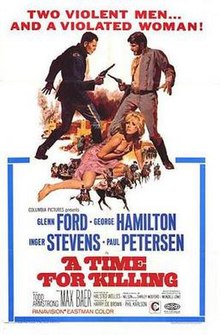A Time for Killing
| A Time for Killing | |
|---|---|
 A Time for Killing film poster | |
| Directed by | Phil Karlson Roger Corman (uncredited) |
| Screenplay by | Halsted Welles |
| Produced by | Harry Joe Brown |
| Starring | Glenn Ford George Hamilton Inger Stevens |
| Cinematography | Kenneth Peach |
| Edited by | Roy V. Livingston |
| Music by | Mundell Lowe |
| Distributed by | Columbia Pictures |
Release date |
|
Running time | 88 min |
| Country | United States |
| Language | English |
| Budget | $2 million[1] |
A Time for Killing is a 1967 Western Pathécolor Panavision film started by Roger Corman but finished by Phil Karlson, and starring Glenn Ford, George Hamilton, Inger Stevens and Harrison Ford (credited as Harrison J. Ford) in his first (credited) film role.[2] The film was Glenn Ford's one hundredth.
Plot
During the Civil War, Confederate soldiers escape from a Union prison and head for the Mexican border. Along the way, they kill a Union courier bearing the news that the war is over. Keeping the message a secret, the captain has his men go on and they soon find themselves in a battle with the Union search party who also is unaware of the war's end.
Cast
- Inger Stevens as Emily Biddle
- Glenn Ford as Maj. Tom Wolcott
- Paul Petersen as Blue Lake
- Timothy Carey as Billy Cat
- Kenneth Tobey as Sgt. Cleehan
- Richard X. Slattery as Cpl. Paddy Darling
- Harrison Ford as Lt Shaffer (as Harrison J. Ford)
- Kay E. Kuter as Owelson
- Dick Miller as Zollicoffer
- Emile Meyer as Col. Harries
- Marshall Reed as Stedner
- George Hamilton as Capt. Dorrit Bentley
- Max Baer Jr. as Sgt. Luther Liskell
- Todd Armstrong as Lt. 'Pru' Prudessing
- Harry Dean Stanton as Sgt. Dan Way
Production
The film originally began under the title The Long Ride Home and was to be directed by Roger Corman from a script by Robert Towne. However Corman was replaced by Karlson after several weeks shooting.[3] Once Corman left, his editor Monte Hellman also left the project.[4]
Casting
The film was originally offered to Warren Beatty[5] and Cliff Robertson[6] who both turned it down.
Soundtrack
The original score of the film was composed by Van Alexander who was given seven weeks to compose 45 minutes of music for the film. He collaborated with Ned Washington for a title song by Eddy Arnold. Though producers Harry Joe Brown, Jonie Taps and Columbia's Mike Frankovich were enthusiastic about Alexander's score, once the film was met with a disastrous reception at a preview it was decided to restore the film with a guitar score by Mundell Lowe.[7] Alexander never composed another score for a feature film.
See also
References
- ^ Beverly Gray, Roger Corman: Blood Sucking Vampires, Flesh Eating Cockroaches and Driller Killers, AZ Ferris 2014 p 65-66
- ^ Duke, Brad. Harrison Ford: The Films. USA: McFarland & Company. ISBN 0-7864-4048-1.
{{cite book}}: Cite has empty unknown parameter:|coauthors=(help) - ^ p. 23 Joyner, C. Courtney Glenn Ford Interview in The Westerners: Interviews with Actors, Directors, Writers and Producers McFarland, 14 Oct 2009
- ^ p. 95 Albright, Brian Monte Hellman Interview in Wild Beyond Belief!: Interviews with Exploitation Filmmakers of the 1960s and 1970s McFarland, 9 Apr 2008
- ^ Biskind, Peter Star: The Life and Wild Times of Warren Beatty Simon and Schuster, 3 Apr 2010
- ^ Desert Sun, Number 254, 28 May 1966
- ^ Alexander, Van & Fratallone, Stephen From Harlem to Hollywood: My Life in Music BearManor Media, 14 Aug 2015
External links
- A Time for Killing at IMDb
- ‹The template AllMovie title is being considered for deletion.› A Time for Killing at AllMovie
- A Time for Killing at the TCM Movie Database
- A Time for Killing at the AFI Catalog of Feature Films
